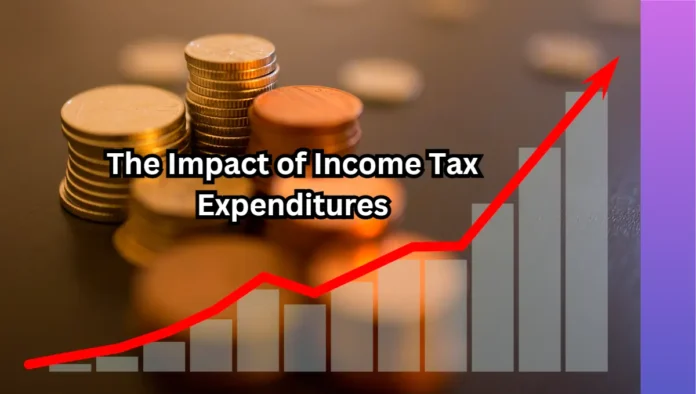The Impact of Income Tax Expenditures on the Economy of Pakistan: Evaluating the Costs and Benefits
Income tax is one of the most important sources of revenue for the government of Pakistan. However, the government also provides certain tax expenditures or tax incentives to taxpayers in order to promote certain economic activities. Tax expenditures can take many forms such as tax deductions, exemptions, and credits. While tax expenditures can help in promoting certain economic activities, they can also have a significant impact on the overall economy. In this article, we will explore the impact of income tax expenditures on the economy of Pakistan.
What are income tax expenditures?
Firstly, let us define what is meant by income tax expenditures. Income tax expenditures are defined as “revenue losses resulting from provisions of the tax code that allow a special exclusion, exemption, or deduction from gross income or provide a special credit, a preferential rate of tax, or a deferral of tax liability”. In simpler terms, income tax expenditures are tax breaks that are given to taxpayers in order to promote certain economic activities.
The impact of income tax expenditures on the economy of Pakistan
While tax expenditures can be beneficial in promoting certain economic activities, they can also have a significant impact on the overall economy. The impact of income tax expenditures on the economy of Pakistan can be both positive and negative. On the positive side, income tax expenditures can help in promoting economic growth by encouraging investment and job creation. For example, the government can provide tax incentives to companies that invest in certain sectors of the economy or create jobs in certain areas. This can help in promoting economic growth and creating employment opportunities.
On the negative side, income tax expenditures can also have a significant impact on government revenues. Tax expenditures can result in revenue losses for the government, which can impact the overall fiscal position of the government. This can lead to a higher budget deficit and a higher level of public debt. Additionally, tax expenditures can also result in a regressive tax system where the benefits of tax expenditures are largely enjoyed by the wealthy taxpayers, while the burden of paying for public services falls on the lower-income taxpayers.
Examples of income tax expenditures in Pakistan
Let us now look at some of the income tax expenditures that are currently in place in Pakistan. One of the major income tax expenditures in Pakistan is the tax deduction on mortgage interest payments. This tax expenditure allows taxpayers to deduct the interest payments on their mortgage from their taxable income. This is intended to encourage homeownership and promote investment in the housing sector. However, this tax expenditure is regressive in nature as it benefits the wealthy taxpayers who are more likely to own homes and have larger mortgages.
Another income tax expenditure in Pakistan is the tax exemption on profits earned from government securities. This tax expenditure is intended to encourage investment in government securities and to support government borrowing. However, this tax expenditure benefits the wealthy taxpayers who are more likely to invest in government securities and have higher incomes.
The need for a targeted approach towards income tax expenditures in Pakistan
Overall, the impact of income tax expenditures on the economy of Pakistan is complex and depends on the specific tax expenditure in question. While tax expenditures can be beneficial in promoting certain economic activities, they can also result in revenue losses for the government and a regressive tax system. It is important for the government to carefully consider the costs and benefits of each tax expenditure and to ensure that they are targeted towards promoting inclusive economic growth and reducing inequality. In conclusion, income tax expenditures can have a significant impact on the overall economy of Pakistan and should be carefully designed and implemented to achieve their intended objectives.
Impact of income tax
To further understand the impact of income tax expenditures on the economy of Pakistan, it is important to look at their overall contribution to the tax revenue. According to the Federal Board of Revenue, the total tax expenditure for the fiscal year 2020-21 was estimated to be around Rs. 680 billion, which is about 1.5% of the Gross Domestic Product (GDP). This indicates that tax expenditures are a significant part of the tax revenue of the country and need to be carefully evaluated.
Additionally, it is important to consider the trade-offs of implementing tax expenditures. While they may promote certain economic activities, they can also result in a loss of revenue for the government, which could impact public services such as education, health care, and infrastructure development. Furthermore, tax expenditures may also create distortions in the economy by incentivizing certain economic activities over others, which can lead to market inefficiencies and reduce overall economic growth.
To address these concerns, the government of Pakistan needs to adopt a more targeted approach towards implementing tax expenditures. This means designing tax expenditures that are directed towards promoting inclusive economic growth and reducing inequality. For example, the government can provide tax incentives to companies that invest in sectors that are critical for creating jobs and reducing poverty, such as agriculture, small and medium-sized enterprises, and healthcare. Additionally, the government can introduce tax expenditures that benefit low-income taxpayers, such as tax credits for education and healthcare expenses.
Conclusion
In conclusion, income tax expenditures can have both positive and negative impacts on the economy of Pakistan. While they can promote certain economic activities and encourage investment, they can also result in revenue losses for the government and a regressive tax system. It is important for the government to carefully evaluate each tax expenditure and ensure that it is targeted towards promoting inclusive economic growth and reducing inequality. By adopting a more targeted approach towards implementing tax expenditures, the government can maximize their benefits while minimizing their costs.
